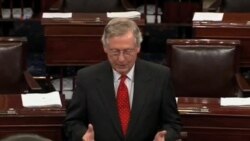WASHINGTON —
The coming week will likely determine whether the United States defaults on its $16 trillion national debt, as a federal shutdown nears a third week. Lawmakers are mounting final efforts to avoid financial calamity and restart government operations after a flurry of proposals from both houses of Congress failed to attract bipartisan support.
Fiscal talks broke down Saturday between Republican leaders of the House of Representatives and the White House. In the Senate, meanwhile, Republicans blocked a Democratic bill to raise America’s borrowing limit for more than a year, and Democrats rejected a Republican proposal with short-term fixes to the debt limit and the federal shutdown.
Discussions are continuing in the Senate between Majority Leader Harry Reid and his Republican counterpart, Mitch McConnell.
“Senator McConnell and I have been in this body for a long time. We have done things for a long time together. I know him, he knows me. We do not agree on everything,” said Reid.
McConnell has long advocated dialogue. “Talk we should. The American people have given us divided government. And when you have divided government, it means you have to talk to each other,” said McConnell.
But talks do not guarantee agreement. President Barack Obama continues to reject Republican stipulations for extending the debt limit or reopening the government.
“Manufacturing crises to extract massive concessions is not how our democracy works, and we have to stop it. Politics is a battle of ideas, but you advance those ideas through elections and legislation - not extortion,” said Obama.
House Republicans, meanwhile, have given no indication they will accept any unconditional plan to end the fiscal impasse. In addition, divisions have opened between House and Senate Republicans, adding to doubts that any bipartisan accord reached in one chamber will be embraced by the other.
Treasury officials say the U.S government risks insolvency unless both houses of Congress vote to raise the debt limit by this Thursday. And, the ongoing government shutdown is believed to be shaving U.S. economic output a little more each day it drags on.
Fiscal talks broke down Saturday between Republican leaders of the House of Representatives and the White House. In the Senate, meanwhile, Republicans blocked a Democratic bill to raise America’s borrowing limit for more than a year, and Democrats rejected a Republican proposal with short-term fixes to the debt limit and the federal shutdown.
Discussions are continuing in the Senate between Majority Leader Harry Reid and his Republican counterpart, Mitch McConnell.
“Senator McConnell and I have been in this body for a long time. We have done things for a long time together. I know him, he knows me. We do not agree on everything,” said Reid.
McConnell has long advocated dialogue. “Talk we should. The American people have given us divided government. And when you have divided government, it means you have to talk to each other,” said McConnell.
But talks do not guarantee agreement. President Barack Obama continues to reject Republican stipulations for extending the debt limit or reopening the government.
“Manufacturing crises to extract massive concessions is not how our democracy works, and we have to stop it. Politics is a battle of ideas, but you advance those ideas through elections and legislation - not extortion,” said Obama.
House Republicans, meanwhile, have given no indication they will accept any unconditional plan to end the fiscal impasse. In addition, divisions have opened between House and Senate Republicans, adding to doubts that any bipartisan accord reached in one chamber will be embraced by the other.
Treasury officials say the U.S government risks insolvency unless both houses of Congress vote to raise the debt limit by this Thursday. And, the ongoing government shutdown is believed to be shaving U.S. economic output a little more each day it drags on.





